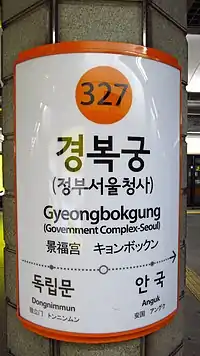| |||
|---|---|---|---|
 | |||
| Korean name | |||
| Hangul | |||
| Hanja | |||
| Revised Romanization | Gyeongbokgungnyeok | ||
| McCune–Reischauer | Kyŏngbokkungnyŏk | ||
| General information | |||
| Location | 81-1 Jeokseon-dong, 130 Sajingno Jiha, Jongno-gu, Seoul[1] | ||
| Coordinates | 37°34′33″N 126°58′25″E / 37.57577°N 126.97359°E | ||
| Operated by | Seoul Metro | ||
| Line(s) | Line 3 | ||
| Platforms | 1 | ||
| Tracks | 2 | ||
| Construction | |||
| Structure type | Underground | ||
| Key dates | |||
| October 18, 1985[1] | Line 3 opened | ||
| Passengers | |||
| (Daily) Based on Jan-Dec of 2012. Line 3: 46,531[2] | |||
Gyeongbokgung station is a subway station on Line 3 of the Seoul Metropolitan Subway. It is the subway station nearest to the Gyeongbokgung Palace. The station is also near the Government Complex–Seoul, the National Police Agency of South Korea, and other administrative buildings in the neighborhood.[3][1]
Station layout
| G | Street level | Exit |
| L1 Concourse |
Lobby | Customer service, shops, vending machines, ATMs |
| L2 Platform |
Northbound | ← Line 3 toward Daehwa (Dongnimmun) |
| Island platform, doors will open on the left | ||
| Southbound | Line 3 toward Ogeum (Anguk) → | |
Vicinity
- Exit 1: Sajik Park
- Exit 2: Hyoja-dong
- Exit 3: Chinese Embassy of Korea
- Exit 4: Cheongwadae
- Exit 5: Gyeongbok Palace, Gwanghwamun
- Exit 6: Government Complex-Seoul, Gwanghwamun Station
- Exit 7: Seoul Metropolitan Police Agency
Tourism
The station displays artifacts from various dynasties, with walls decorated in ornate displays design to appeal to tourists.[4]
In January 2013, the Seoul Metropolitan Rapid Transit Corporation, which operates this line, published free guidebooks in three languages: English, Japanese and Chinese (simplified and traditional), which features eight tours as well as recommendations for accommodations, restaurants and shopping centers. The tours are designed with different themes, e.g. Korean traditional culture, which goes from Jongno 3-ga Station to Anguk Station and this station on line No 3 that showcases antique shops and art galleries of Insa-dong.[5]
References
- 1 2 3 "경복궁역" (in Korean). Doopedia. Retrieved 2017-01-20.
- ↑ Monthly Number of Passengers between Subway Stations Archived 2014-10-06 at the Wayback Machine. Korea Transportation Database, 2013. Retrieved 2013-10-15.
- ↑ "Gyeongbokgug". Seoul Metro. Archived from the original on 2017-10-30. Retrieved 2017-01-20.
- ↑ Murthy, Rishika (22 September 2011). "Seoul's 6 coolest subway stops". CNN Travel. Retrieved 26 February 2013.
- ↑ Kwon, Sang-soo (26 January 2013). "Free guide for Seoul's subway riders". Joongang Daily. Archived from the original on 12 April 2013. Retrieved 27 January 2013.
{{cite news}}: CS1 maint: unfit URL (link)
| Preceding station | Seoul Metropolitan Subway | Following station | ||
|---|---|---|---|---|
| Dongnimmun towards Daehwa |
Line 3 | Anguk towards Ogeum | ||
